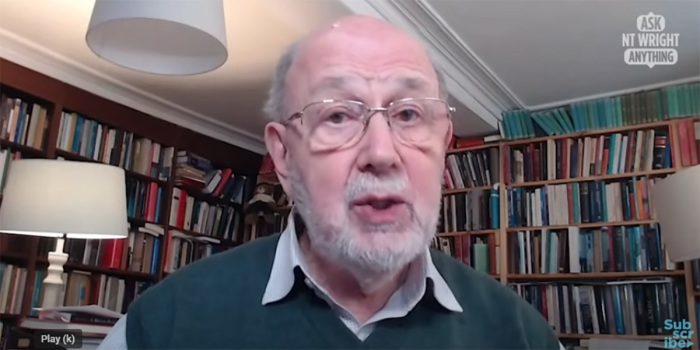
New Testament scholar N.T. Wright recently pushed back on the assumption that Jesus and the apostle Paul expected the world to end within a generation, saying their primary focus was the coming destruction of Jerusalem, not the final return of Christ.
“I think that Paul was aware, like all early Christians, because Jesus had said so, that Jerusalem would be destroyed within a generation of Jesus’ own time,” Wright said during a recent episode of his “Ask N.T. Wright Anything” podcast.
“That’s a major theme in Matthew, Mark and Luke. It’s hinted at elsewhere. And I think it’s hinted at, for instance, in the Thessalonian correspondence in Paul and also in First Corinthians Seven, when he talks about the appointed time being constrained.”
His remarks came in response to a question from a listener who asked whether Paul would have been “puzzled or unaffected” by Christ’s apparent 2,000-year delay, and how he might have responded to the vast scale of the universe as we now understand it.
“That theme has been largely ignored by many modern Christians, particularly modern liberal Christians, who have wanted to say, ‘Oh, well, Jesus and Paul thought the world was going to end. It didn’t. So they were wrong. So they were probably wrong about a lot of other stuff as well,’” Wright continued. “That’s been a major theme of much liberal theology the last 150 or so years. And I think it’s simply misconceived.”
According to Wright, both Jesus and Paul took for granted that one day God would set the world right — but specific “within a generation” warnings in the Gospels referred to Jerusalem’s fall in A.D. 70, not the ultimate culmination of history.
“Jesus, I think, hints at the coming time when all things are going to be resolved and put right — the great coming palingenesia, or rebirth, He speaks of in Matthew 18, or the time which Peter refers to in Acts when God is going to put everything right at last,” he said. “They take for granted the fact that one day, God, the Creator, will put everything right.”
Wright emphasized that this distinction between the fall of Jerusalem and the end of the world is vital for interpreting early Christian expectations.
“I don’t think Paul would be alarmed or surprised,” he said. “There’s no sense of failure or trauma or anything that it didn’t, in fact, end after one generation.”
He pointed to second- and third-century church leaders such as Justin Martyr, Irenaeus and Tertullian, noting that they continued to affirm hope in the eventual renewal of the world without distress over the passing of time. “
“Tertullian is still talking cheerfully about the coming Great Day when we will all celebrate the renewal of God’s world,” Wright said.
The New Testament itself provides the theological framework for this kind of delay, he added, citing 2 Peter: “That one day is with the Lord as a thousand years, and vice versa … God’s in charge of time. It’s up to Him.”
Co-host Mike Bird noted that the challenge of waiting for divine justice was a deeply Jewish concern long before Christianity. “The problem of delay was not unique to Christianity. It was inherited from the Jewish tradition,” Bird said. “Whole books of the Bible are dedicated to the theme of ‘How long, O Lord, how long?’ … particularly the book of Habakkuk.”
The conversation then turned to the second part of the question: What would Paul have made of the sheer size and scale of the universe?
“When you read a psalm like Psalm 8 — ‘When I consider the heavens, the work of your fingers, the moon and the stars that you’ve ordained’ — now maybe if we’d asked Paul, ‘How far away do you think those are?’ he might have guessed wildly and come up with something quite wrong in terms of our modern scientific knowledge,” Wright said.
Still, he contended, ancient people were not as cosmologically naive as moderns often assume.
“If you look at ancient astronomers, at people like Ptolemy, then you discover that they knew perfectly well that the Earth was, in terms of the vastness of universe, just one tiny speck out of this enormous world in which there were so many other things.”
“The idea that it’s only a modern discovery … is quite wrong,” Wright continued. “People have known for a very long time that the universe is vast. … I don’t think that’s a problem, and I don’t think Paul would have worried about it.”
Bird echoed the sentiment by pointing to a passage from 1 Kings: “I’m always impressed with what we find in, I think it’s 1 Kings 8, where Solomon says, ‘Heaven and Earth cannot contain you. How much less this temple I have built?’ I think some of the ancients knew they were living in a very big space … and God Himself was bigger than all that combined.”
Leah M. Klett is a reporter for The Christian Post. She can be reached at: leah.klett@christianpost.com

















